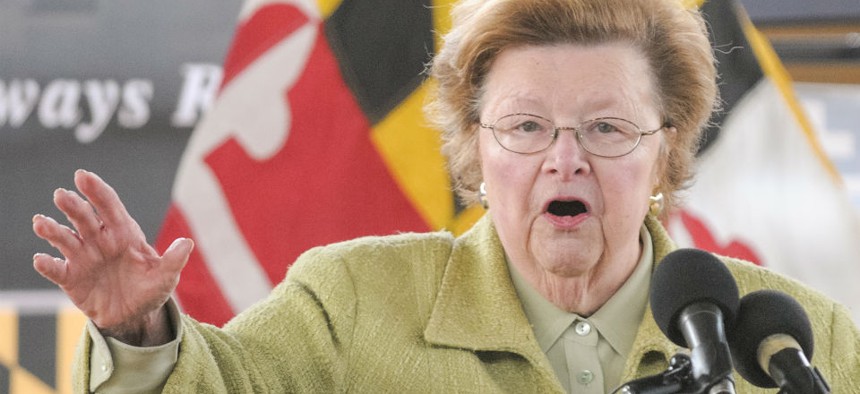
Federal workers "have been undervalued and underappreciated for too long,” said Senate Appropriations Committee Chairwoman Barbara Mikulski, D-Md. Staff Sgt. Thaddeus Harrington/Maryland National Guard
Feds, Troops Still On Track for a 1 Percent Pay Raise in 2015
CRomnibus package allows for increase, freezes congressional salaries.
Federal civilian employees and military service members would receive a 1 percent pay raise next year under the long-term spending package congressional appropriators unveiled late on Tuesday.
The $1.01 trillion omnibus package, which funds most of the government through September 30, 2015, allows for a 1 percent pay boost for federal employees, and includes a provision providing a 1 percent raise for troops. The legislative package funds 11 of the 12 annual appropriations bills, including legislation that provides money for defense, financial services and general government activities, the traditional vehicles for federal civilian and military workforce pay.
Senate Appropriations Committee Chairwoman Barbara Mikulski, D-Md., said the 1 percent boost in the omnibus “builds on the modest pay raise for federal employees in 2014.” Mikulski, who represents many federal workers in her state, said government employees “have been undervalued and underappreciated for too long.”
A temporary continuing resolution will fund the Homeland Security Department at the fiscal 2014 level through Feb. 27, 2015. Republicans did not want to include the department in the long-term omnibus because of opposition to President Obama’s executive order on immigration.
House leaders are expected to introduce a stopgap spending bill to allow Congress more time to push through the larger package over the next week, and avoid a government shutdown. The current continuing resolution keeping the government running expires on Thursday.
Lawmakers ultimately chose to support President Obama’s recommended 1 percent pay raise for federal workers and troops next year, instead of including a specific provision to block it or provide for a different amount. Under automatic cost-of-living adjustments, civilian employees would have received a 1.3 percent boost, while service members would have received a 1.8 percent pay increase.
The formula for determining service members’ annual pay increase is based on the Bureau of Labor Statistics’ Employment Cost Index and the growth in private-sector wages. But under the law (Title 37, Chapter 19, Section 1009) the president has the authority to set an alternate pay raise for military personnel, citing a national emergency or fiscal concerns, if Congress doesn’t pass legislation adjusting the amount or canceling it. The 1990 Federal Employees Pay Comparability Act allows the president through executive order to set a pay raise for federal civilian employees under the same circumstances.
To see a history of annual pay raises for federal civilian employees dating back to 1970, click here.
The omnibus package also includes a provision freezing the salaries of members of Congress for the sixth consecutive year. Rank-and-file members of Congress now receive an annual salary of $174,000; the House speaker earns $223,500 per year, while the Senate president pro tempore and the majority and minority leaders in both chambers each receive an annual salary of $193,400. Members of Congress would have received a $2,800 pay increase next year according to automatic cost-of-living adjustments.
In addition, the legislation includes a pay freeze for the vice president and senior political appointees.
Some agencies took a significant hit in funding for fiscal 2015. The Internal Revenue Service received $10.9 billion – a reduction of $345.6 million below fiscal 2014 and $1.5 billion below Obama’s request. It brings the agency below its fiscal 2008 total.
“This budget hurts everyone in our country by further eroding the IRS’ ability to provide tax assistance to millions of Americans, curb tax fraud and collect the taxes owed that finance vital programs and services and reduce the federal deficit,” said Colleen Kelley, president of the National Treasury Employees Union, calling the cuts “short-sighted, politically driven budgeting.” A major management scandal involving alleged political targeting of certain groups that applied for tax-exempt status engulfed the agency last year and sparked several investigations.
“This package makes the most of each and every dollar, roots out waste and abuse, reins in bureaucratic overreach, and provides stable funding for important national programs – including our national defense – for the remainder of the fiscal year,” said House Appropriations Chairman Hal Rogers, R-Ky., in a statement on the omnibus. “It reflects conservative priorities, yet it is also a compromise bill that can and should have wide bipartisan support in both the House and Senate.”







